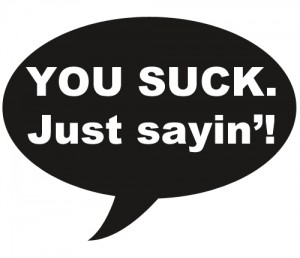“Just sayin’.”
How many times do we hear it in conversation or see it in an email or on social media?
 “Just sayin'” is the qualifier for all sorts of observations. It is used as a psychological buffer or protective force field against the blow-back that might otherwise be expected to accompany an offensive, derogatory, or mean-spirited remark.
“Just sayin'” is the qualifier for all sorts of observations. It is used as a psychological buffer or protective force field against the blow-back that might otherwise be expected to accompany an offensive, derogatory, or mean-spirited remark.
I decided to Google the question, “Why is everyone saying just saying?”
The top result is from Psychcentral.com and here is a bit of their wisdom on the subject:
Lately the annoying expression “I’m just saying” — usually tacked to the end of what would be an otherwise thoughtless remark — keeps coming up in everyday conversation. We cannot escape. But we can be onto the hidden dynamics that make this and other such figures of speech so irritating, and we can prepare ourselves for the next time.
Brooke was chatting with her sister Ashley and provocatively remarked, “Don’t you think you should stay longer when you visit your family? You’re so selfish.”
“I’m doing my best. You’re pressuring me,” Ashley replied.
“I’m just saying!” Brooke retorted.
Oh, well. In that case…
Brooke used the expression “I’m just saying” after making an off-putting remark, conveniently absolving herself of responsibility for the affront. This tagline is a handy conversational tool: It serves as a free pass for the speaker to say anything and then negate any ill intent.
Often the remark preceded by “I’m just saying” is unsolicited and provocative. “I’m just saying” creates a confusing interpersonal dynamic. The speaker unconsciously attempts to trick the listener into believing an altered reality in which he or she is blameless, and the listener is implicitly accused of having an unfounded reaction. In this altered reality both are supposed to pretend that:
- The speaker didn’t really say anything upsetting.
- I’m just saying” magically neutralizes any negative reaction.
- The speaker can say whatever he or she wants as long as it’s followed by “I’m just saying.” Then, no one can hold the speaker accountable.
Pretty good observations. The writer goes on to note that when we make comments that we suddenly feel exposed or possibly stupid for making, we may use “just saying” as a kind of parachute (my analogy, not theirs).
I am happy to find that I am not the only one annoyed by the people who are always “just saying” stuff. I think it is a cheap trick and an easy out for people to be mean and ornery and avoid accountability for it.
“What??? I was just sayin’…”
I also like what Joshua David Stein had to say about this irritation on Gawker.com:
Just Sayin’ is meant to be a puckish little disclaimer to convey, “I have no vested interest in what I’ve just said. The preceding thought was meant only to be informative and, in fact, I might not even believe what I just said.” Just sayin’ is almost always used sarcastically and passive aggressively. It is frequently the last phrase in a sentence or a thought. There are 2258 Lexis hits for Just sayin’ and an astonishing 1,940,000 Google hits. Many of the instances are in comments but clearly the pandemic is here.
“Passive aggressively.” Stein nailed it right there.
Since some of my readers know me too well, I may as well confess to sometimes being mean and ornery. I have resisted, however, the temptation to avoid responsibility for my explosive or acerbic commentary by “just saying.” I am not asking for any special credit here. I think the reason I do not use the phrase is that it has always annoyed me to no end when it has been used on me.
I guess I would rather offend you than annoy you.
At any rate, I say it is high time we quit saying that we are “just saying” and either say what we have to say or shut the Hell up.
Just sayin’.
